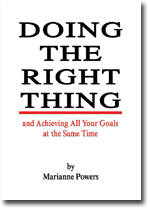Chapter 1
“I can’t work with her, she’s stupid.” Okay, maybe I wasn’t that blatant. But I have often complained about another person, expecting the listener to understand that it was impossible for me to work with this person because of what he or she “is” – stupid, lazy, crazy, whatever. The person listening to me usually agreed. They didn’t want to work with stupid, lazy, or crazy people either. But that was when I believed that I could actually figure out what a person “is”, and that what a person “is” matters.
There was a clue that I wasn’t very good at figuring out what a person “is”. The clue was that it was usually easier to get agreement if the person I was talking to didn’t know the person I was talking about. If the only information they had was what I was telling them, they usually saw it my way. But, if the person I was talking to did know the person I was talking about, I often got an argument from them. They saw the other person differently than I did.
Another clue was that even people that seemed lazy, stupid, or bad to me had friends, too. And sometimes, the people who liked them were people that I liked. Of course, there was always an explanation for that – the bad person that I didn’t like had fooled the good person I liked – but there was another explanation. They saw the other person differently than I did.
Even if I could get someone who knew the person to agree with me, there always seemed to be someone else who disagreed. Or we all agreed that a person had one attribute, but still disagreed on whether it was important, or on what other qualities or defects they had and how important those were. We were all looking at the same person, but each of us put that person in a different box, depending on what we thought was their dominant quality or defect.
It could be that I was an exceptionally bad judge of people, but I don’t think the problem was my skill at it. I think the problem was in judging people at all. People seem different to other people because they are different in different situations and at different times. New experiences and insights give people attributes they never had before. And people are many things at once.
I am intelligent if you talk to me about my work. I am stupid if you talk to me about art. I am energetic at my job. I am lazy at housekeeping. I am kind, cooperative, and understanding with people who help me achieve my goals. I am suspicious and critical of people who try to prevent me from reaching my goals.
People are a conflicting conglomeration of thoughts, emotions, experiences, skills, ineptitudes, qualities, and defects. No one is perfect, or its opposite, for that matter. One word can’t sum up a person. And people won’t be just one thing because it’s easier for us to deal with them that way. They are what they are. And it doesn’t matter what they are.
For us to do the right thing and achieve all our goals, it’s not other people who must be something in particular, it is us. To do the right thing and accomplish all our goals, we must be consistent and fair and unbiased -- we must treat each person the same as we treat every other person, no matter who they are, no matter what they are. For us to do the right thing and accomplish all our goals, what we say and do can’t depend on what anyone else “is”.
We must treat our allies well, so they will continue to be our allies, and because it’s the right thing to do. We must treat our opponents well, so that it’s possible for them to become our allies, and because it’s the right thing to do. If we treat our allies well and our opponents badly, we’re not trying to achieve a goal, we’re trying to win a power struggle. If we believe our goals are good, we must keep trying to convince the people that don’t see it. If we give up on our opponents, we obviously don’t believe that the goal is good for them, too. We give up on our own goal and prove that they were right to oppose us.
To accomplish our goals, we don’t need other people to be something, we need them to do something. To do something, people only have to understand what we want, know how to do some part of it, and be willing to do it.
It is not necessary or productive for us to figure out what people “are”, which is good, since it's nearly impossible.



1 Comments:
It seems that I'm getting more popular. But is it for the right reasons?
Post a Comment
<< Home